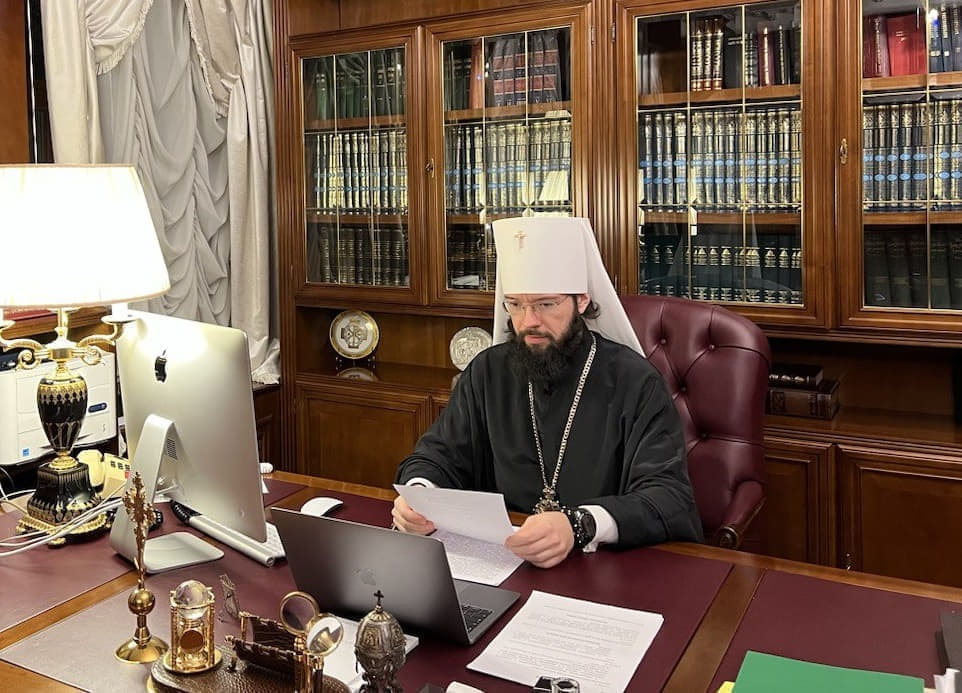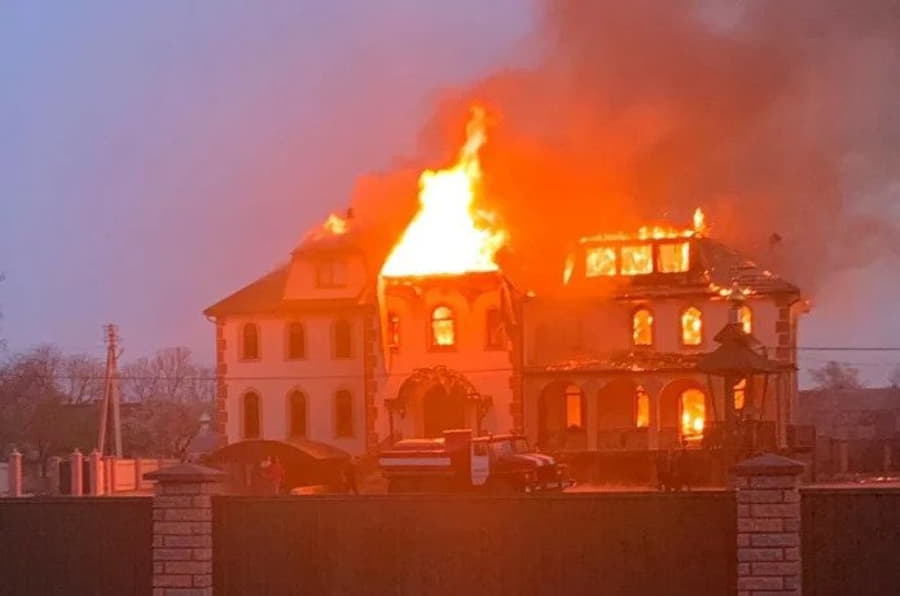In this address to the UN Security Council, Metropolitan Anthony of Volokolamsk, details the crimes of President Zelensky against Christians, who belong to the Ukrainian Orthodox Church, including torture, arrests, public beatings, murder of priests, and churches arbitrarily seized and, at times, set on fire. All this violence is abetted by a relentless denigration in Ukrainian media, which slanders these Christians as “Putin stooges,” and therefore fair-game. Few in the West even know about these atrocities, which occur daily in Zelensky’s Ukraine. The crime of these Christians? They refuse to join the government-approved, CIA-created, schismatic church of Zelensky.
Metropolitan Anthony is Chairman of the Department for External Church Relations of the Moscow Patriarchate. He served Orthodox dioceses in Rome and in Paris. (A metropolitan is a senior bishop).
This address was delivered on January 17, 2023. Given the increase in anti-Christian violence in Ukraine, we thought it important to share Metropolitan Anthony’s concerns and warnings.

Dear Mr. Chairman:
I thank you for the opportunity to speak at this high gathering. The Russian Orthodox Church, both independently and in cooperation with the other Orthodox Churches, the Roman Catholic Church, Protestant denominations and representatives of the world’s traditional religions, does as much as it can to protect the rights of believers throughout the world, especially Christians. At present we are extremely concerned about flagrant violations of universal and constitutional rights of Orthodox believers in Ukraine.
It is difficult to overestimate the peacemaking potential of religion and the Church in interstate and civil conflicts. Orthodox Christianity has for centuries provided a common spiritual and cultural basis for the lives of the peoples of Russia and Ukraine and could serve to restore mutual understanding in the future. But the very basis of such a dialogue is being undermined in Ukraine right now, where attempts are being made to destroy the Ukrainian Orthodox Church at the initiative of the Ukrainian leadership. The Ukrainian Orthodox Church is not a political, but a religious organization that brings together more than 12,000 communities and millions of Ukrainian citizens.

On December 2022, the National Security and Defense Council of Ukraine issued a decision, the actual purpose of which is to limit the rights of communities of the Ukrainian Orthodox Church. The state body adopted a number of measures that include instructing the government to prepare a draft law on “the impossibility of activities in Ukraine of religious organizations affiliated with centers of influence” in Russia—in fact, we are talking about banning the Ukrainian Orthodox Church, although its governing center is in Kiev, not in Moscow, and it is administratively independent of the Russian Orthodox Church; intensification of counterintelligence “activities” of Ukrainian special services in relation to the Ukrainian Orthodox Church; depriving the Ukrainian Orthodox Church of the right to use churches of the most important historical monastery—the Kyiv Monastery of the Caves (Pechersk Lavra); introduction of so-called “sanctions” against its clergy.
On the same day, the decision was approved by a decree of Ukrainian President V.A. Zelensky; his subsequent decrees established the list of bishops of the Ukrainian Orthodox Church subjected to “sanctions.” “Sanctions” mean, among other things, the actual deprivation of rights to manage property in Ukraine.
Moreover, as reported by the Ukrainian media, a number of bishops of the Ukrainian Orthodox Church were subsequently deprived of Ukrainian citizenship by decree of President Zelensky, which will probably be used as grounds for their forced expulsion from the country.
Meanwhile, Article 25 of the Constitution of Ukraine states: “A citizen of Ukraine cannot be deprived of citizenship and the right to change citizenship. A citizen of Ukraine may not be deported from Ukraine.
Article 9 of the UN-sponsored Convention on the Reduction of Statelessness, to which Ukraine acceded in 2013, states: “No Contracting State may deprive any person or group of persons of their nationality on racial, ethnic, religious or political grounds.”
Ukrainian episcopate and clergy lists are adopted by the National Security and Defense Council of Ukraine without a legitimate judicial and investigative procedure or the opportunity to challenge the decision. “Sanctions” and deprivation of citizenship are applied to clerics of only one confession, while Article 24 of the Constitution of Ukraine expressly prohibits privileges or restrictions on the rights of Ukrainian citizens on the basis of their religious beliefs.
Thus, deprivation of citizenship of Ukrainian religious figures is undoubtedly a form of mass political repression that contradicts the Constitution of Ukraine and international agreements adopted by this state. At the same time, precisely those rights and freedoms are violated, the restriction of which is expressly prohibited by Article 64 of the Constitution of Ukraine, even during martial law or state of emergency.
Since October 2022 up to the present time, under the pretext of “counterintelligence activities,” the Security Service of Ukraine has conducted mass searches in monasteries and communities of the Ukrainian Orthodox Church all over the country. During these activities, the honor and dignity of clergymen are humiliated, and false, slanderous rumors are spread in the media. For far-fetched reasons, criminal cases are brought against the episcopate and clergy of the Ukrainian Orthodox Church. As in the years of atheistic persecution in the Soviet Union, they are groundlessly accused of anti-state activities. Old newspapers and magazines, theological and historical books from the personal libraries of the victims serve as “evidence.”
Political repressions against the episcopate of the Ukrainian Orthodox Church have been the culmination of the repressive religious policy of the Ukrainian authorities in recent years, the ultimate goal of which—contrary to Article 35 of the Ukrainian Constitution on the separation of the Church from the state—is the total control of religious life of society by state authorities.
In 2018, with the active anti-constitutional intervention of the state apparatus and special services of Ukraine and with gross violations of Orthodox canon law, the so-called “Orthodox Church of Ukraine” was created. Further efforts by the authorities are aimed at forcing the communities of the Ukrainian Orthodox Church to join the new religious organization created by the Ukrainian state and enjoying its patronage.
In 2019, new norms of religious legislation were introduced in Ukraine, making it easier for raiders to seize churches by holding fictitious referendums of residents of territorial formations, ignoring the opinions of members of religious communities of these churches, but with the intervention of outsiders, sometimes armed persons. Such seizures are accompanied by falsified documents, gross violations of the law, mass clashes, and beatings of believers and clergy. In 2022, 129 churches of the Ukrainian Orthodox Church were seized. The legal registration of its new congregations is completely blocked.
In 2019, a law was also passed to change the name of the Ukrainian Orthodox Church with the easily identifiable goal of alienating its property. Due to its inconsistency with the Constitution of Ukraine, the law was suspended pending review by the Constitutional Court of Ukraine at the suit of a group of Verkhovna Rada deputies. However, last month the law was enacted. Now there are seven more bills registered in the Verkhovna Rada of Ukraine aimed at restricting the rights or liquidating the Ukrainian Orthodox Church. Lawmakers do not hide the fact that the goal of their drafts is to infringe on the rights of communities and believers of the Ukrainian Orthodox Church, to forcibly seize its property, deprive it of its historical and legal name, forbid it to call itself Orthodox and, finally, to ban its activities and completely liquidate it on Ukrainian territory.
By violating the principle of the separation of the church from the state, confirmed by Article 35 of the Constitution of Ukraine, the leadership of Ukraine and local governments actually prohibit the use of intra-church theological and canonical criteria in assessing religious phenomena and officially require communities of the Ukrainian Orthodox Church to join other religious organizations.
The Ukrainian media conducts an unbridled smear campaign against the Ukrainian Orthodox Church, calling for a complete ban on its activities and for the use of pressure and violence against its representatives, which bears clear signs of hate speech. Such an information background leads to a surge of violence against believers: numerous cases of arson and vandalism in churches, beatings or even attempted murders of clergy—sometimes right in churches, during services.
Mr. Chairman, distinguished members of the Council, in conclusion of my speech I would like to call your attention to the illegal actions of state authorities of Ukraine in relation to the largest denomination of the country, numerous facts of violation of the rights of believers guaranteed by the UN Charter, the Universal Declaration of Human Rights, the Declaration on the Elimination of All Forms of Intolerance and Discrimination Based on Religion or Belief, the International Covenant on Civil and Political Rights, the International Convention on the Elimination of All Forms of Racial Discrimination and the International Covenant on Civil and Political Rights.
Thank you for your attention.
